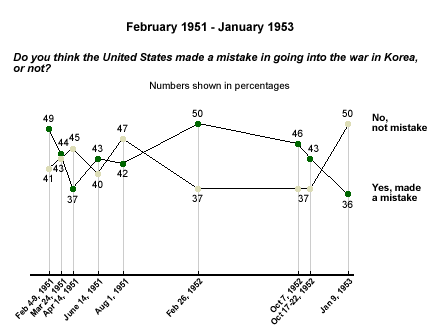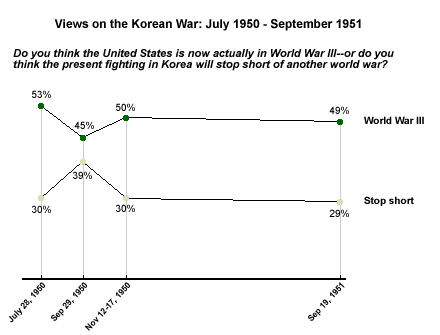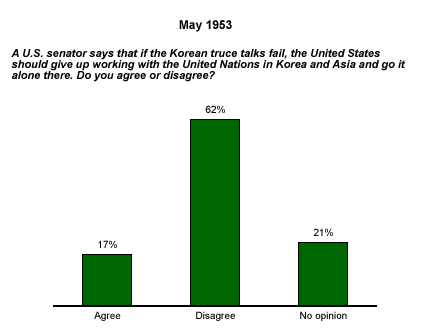Last week's news that U.S. spy satellites have spotted trucks taking North Korea's stockpile of nuclear fuel rods out of storage may add to American concerns about the growing threat of North Korea's weapons programs. In response to a recent Gallup Poll, 14% of Americans described North Korea's military and weapons capabilities as a "crisis for the United States," and an additional 60% said it was a "major problem."
A year ago, President Bush drew many Americans' attention to North Korea's oppressive regime in his State of the Union address, when he included it with Iraq and Iran in his "axis of evil." In response to a poll shortly thereafter, 54% of Americans said they would describe the North Korean government as "evil," putting it lower on the list than the Iraqi government (82%) and the Iranian government (69%), but higher than those of Cuba (45%) and China (38%). And a majority of Americans (65%) had an unfavorable view of North Korea, while fewer than one in four had a favorable view, according to a February 2002 Gallup Poll.
The bulk of that negativity about North Korea undoubtedly resulted from Bush's comments and the subsequent media coverage of dictator Kim Jong Il's human rights abuses and failure to address the devastating poverty of his people. But the opinions of older Americans are probably colored by memories of the Korean War, in which more than 35,000 Americans were lost. The February 2002 Gallup Poll showed that 75% of Americans age 50 or older had an unfavorable view of North Korea, compared to just 48% of those under age 30. A look back at public opinion during the Korean War helps provide context for today's sentiment, and also offers some insight about Americans' perceptions of the United Nations.
Public Support for the War
In October 1945, just after World War II, the United Nations was established by representatives of 50 countries to promote peace and international cooperation. In August of that year, the Soviet Union and the United States agreed to protect Korea against Japanese control by occupying the country, dividing their forces along the 38th parallel. But by 1950, the Cold War had begun. What started as a cooperative effort in Korea turned into ideological conflict, as the superpowers each feared the other would try to take control of the Korean peninsula.
President Harry S. Truman sent U.S. ground troops into Korea on June 30, 1950. At that time, 78% of Americans said they approved of Truman's decision to send military aid, and 15% disapproved. By the following year, however, public support had eroded, and it fluctuated thereafter, in response to events in the war.

When Americans were first asked, in August 1950, if deciding to defend South Korea was a mistake, only 20% thought it was, while 65% said it was not a mistake. But by the following January, opinion had shifted dramatically, and 49% thought the decision was a mistake, while 38% said it was not, and 13% had no opinion.
In the next several months, as Gallup asked the public if "going into war in Korea" was a mistake, opinion remained relatively stable, with more Americans saying it was than saying it was not. Six months later, as truce talks were being conducted at Kaesong, Americans were feeling more positive -- 42% felt the war was a mistake, while 47% said it wasn't. But the numbers shifted again six months later in February 1952, when a majority said the war was a mistake for the United States, soon after a POW exchange proposal by the United Nations was rejected, and riots in the United Nations' overcrowded Koje-do prison camp resulted in the deaths of many North Korean prisoners.
By January 1953, soon after Eisenhower was elected and truce talks began again, the American opinion shifted yet again, with half of Americans saying the war was not a mistake, while a low of 36% said it was a mistake.
Reflecting Americans' tentative attitudes toward the war is the finding that about half the population believed that the fighting in Korea was the next world war. It's a conclusion that surely seemed natural to many at the time, given that the planet had suffered two devastating world wars in the previous 40 years.

Role of the United Nations
Americans' responses to questions about the United Nations' role in the Korean conflict portray the early stages of an ongoing love/hate relationship. Given that the United Nations' precursor, the League of Nations, had failed to prevent World War II, many Americans favored giving the United Nations considerable power. In March 1951, nearly half (49%) of Americans thought the United Nations should be strengthened to make it a world government with power to control the armed forces of all nations, including the United States, while 36% thought it should not. At roughly the same time, Americans expressed some frustration with America's U.N. partners -- in July 1950, 73% of Americans said they didn't think the other U.N. members were doing enough to help the United States with the fighting in Korea.
Generally throughout the course of the war, Americans were supportive of U.N. efforts to achieve peace, although when asked in September 1951 whether they thought the attitude of U.N. military leaders in the truce talks was too tough or not tough enough, 65% said "not tough enough," while 21% said "about right." Finally, when truce talks were at a critical point toward the end of the war, a majority of Americans disagreed with the idea that America should give up on its partnership with the United Nations in Korea. It's a sentiment echoed by many Americans faced with the prospect of war with Iraq today.

